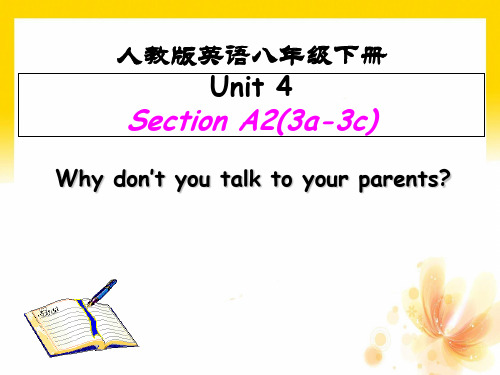英语人教版八年级下册2011人教版八年级下册Unit4SectionB3a-sc
人教版英语八年级下册 Unit4__SectionB2__(3a-Self__check)教案

Unit4 SectionB2 (3a-Self check)参考教案一、教学目标:1. 语言知识目标:1) 复习though, as soon as, so …that等词的用法。
掌握生词perhaps。
2) 能够用英语表达自己的建议,并就自己所熟知的问题发表看法。
3) 能用本单元所学的语言简单表达对困难的一些建议。
2. 情感态度价值观目标:人的一生并不都是一帆风顺的,难免有一些挫折或困难,如果生活中发生了一些不尽如人意的问题,我们要学会冷静对待,学会合理的办法理性地解决。
二、教学重难点1. 教学重点:1) 能运用所学的语言知识来简单地表达自己对某一困难问题的看法和建议。
2)总结本单元所学到的重点词组及句型。
3)复习总结unless, as soon as, so that等词的用法,并能完成相关练习题。
2. 教学难点:运用所学的语言知识来写一封简短的信,表达自己对学生上课外辅导班这一社会现象的看法。
三、教学过程Step 1 RevisionReview the expressions and sentences.1. 一个典型的美国家庭 a typical American family2. 足球训练football training3. 删除cut out4. 比较;对比compare…with5. 逼得太紧push…so hard6. 一个儿童的成长 a kid’s development7. 疲惫的孩子们直到晚上七点钟后才到家。
The tired children don’t get home until after 7:00 p.m.8. 他们总是将自己的孩子与其他的孩子相比较。
They always compare their children with other children.9. 他们为什么不让孩子们顺其自然呢?Why don’t they let their kids be kids?10. 所有这些活动会给孩子们导致很大的压力。
人教版八年级英语下册Unit4 Section B课件

2b. Read the article and answer the questions.
1. What is the common problem for Chinese and American families ?
2. Who gives their opinions about the problem?
1c. Listen and check (✓) the problems Wei Ming talks about.
✓ _________ My parents give me a lot of pressure
about school. ______ I don’t get enough sleep.
tired children don’t get home until after 7:00 p.m. They have a quick dinner, and then it’s time for homework.
Linda Miller, a mother of three, knows all about such stress. “In some families, competition starts very young and continues until the kids get older,” she says. “Mothers send their small kids to all kinds of classes. And they are always comparing them with other children. It’s crazy. I don’t think that’s
Unit 4 Why don’ t you talk to
人教版初中英语2011课标版 八年级下册第四单元Section A 3a—3c(共21张PPT)

Ask for help
Good advice can help us solve the problem easily!
Ask for help
Good advice can help us solve the problem easily!
Ask for help
Good advice can help us solve the problem easily!
(D ) 6. argue (B ) 7. offer to (G ) 8. relation
a. talk to
A.紧张的
b. make it clear B. 主动做...
c. get along with C. 解释
d. worried
D. 吵架
e. not allow
E. 交流,沟通
F. 与…相处
I gueassdyvoiucceouhe problem? 处理
Run away from it or try to solve it. What’s the problem?
problems
The feeling
Ask for help
How to give advice?
G. 关系
H. 拒绝
Ask for help
Good advice can help us solve the problem easily!
Ask for help
Good advice can help us solve the problem easily!
Ask for help
Good advice can help us solve the problem easily!
+Unit4Section++B+3a-课件+2023-2024学年人教版八年级英语下册

Yours truly, Weisiong
Fill in the blanks using until, so that or although.
I think / believe that ... . In my opinion, ... .
Some parents think ... , but I want to say... .
Body
In my opinion, after-school classes are good for the children’s future. They can help children get into good high schools and universities.
Children have more time than parents, so they can learn more thve to learn skills they are not interested in.
After-school classes take away the children’s free time. Children have no time to relax.
1. You should eat more now ______ you won't be hungry later. 2. ________ you may not like to do chores, you should help your parents around the house. 3. You could save more money ____ you can buy a gift for your friend's birthday. 4. Kids shouldn't play computer games _____ late at night. They should rest early. 5. _________ many people like to eat junk food, they should really eat more fruit and vegetables _______ they can be healthy.
英语人教版八年级下册Unit4 Section A (3a-3c)

Reading aloud
1. Have you ever thought about having a yard sale to sell your things? 2. What would you do with the money you raise?
charity sale (慈善义卖)
Skimming
What’s the main idea of each paragraph?
Paragraph 1
The father didn’t want to give up his football shirts. The family want to sell some of the things in a yard sale. The children were sad to part with their toys.
Group leader: Lily wants to sell … She has owned it for/since … It’s about … She wants to sell it for … XXX… XXX… I…
Thank Homework you for your listening!
学生会主席
Groupwork
1. Work in groups of four. Everyone thinks of one thing you want to sell and writes down its introduction.
a story book I have owned it for ten years. It’s about Cinderella. My mom used to read it for me. I like it very much.
英语人教版八年级下册Unit 4 Section A (3a-3c)

His brother isn’t nice to him. Sit down and He refuses to let him watch communicate with his his favorite TV show. brother. I feel lonely and nervous.
1. Can you get on well with your family? 2. Are the relations between your parents good?
3. Do you have any brothers or sisters? Can you get on well with him/her? 4. Who do you ask for help when you have problems?
3a Read the article quickly and
answer the questions. 1. What’s Sad and Thirteen’s problem? He can’t get on with his family. 2. How does he feel at home? He always feels lonely and nervous.
2. I don’t agree with his advice. I don’t think their parents should fight any more. They should care more about their children and spend more time with them.
not allow — _______ refuse ___________________________________ The workers refused to work on ___________________________________ weekends. worried — ________ nervous __________________________________ He was very nervous during his first ___________________________________ job interview. get along with — ______________ get on with Linda can’t get on well with her elder ___________________________________ sister. ___________________________________
英语人教版八年级下册Unit4 3a-3c
Teaching DesignName Ma Leihong School Yuanshi Middle SchoolTextbook Pep English Book(Go for it!)Grade 8 Unit4 Why don’t you talk to your parents?Section A(3a)1.Teaching materialThe topic is about a boy’s problems and using ‘should’ or ‘could’ to give advice. It’s related to students’life and focuses on teenagers’mental health and moral education.2. StudentsAs for students, they have learned the drills to give advice and have the basic ability of learning by themselves. Nowdays they are in a crucial time of growing up. Most of them have too much stress or many problems. If they don’t solve them in time, they may easily get nervous.3.Learning aims1. Knowledge Object: Review the drills that give advice and input newwords: communicate, refuse, nervous….2. Ability Object:Try to master reading skills: Skimming, Carefulreading and Scanning for details.3. Moral Object:Find proper ways to solve problems.4. Importance and difficultyImportance: Improving reading ability and moral education .Difficulty: Understanding the text.5. Teaching and learning methods1. Use courseware to make the class lively2. Give students tasks and offer them reading methods.3. Design activity survey and debate competition to set off interest.4. Learn by themselves and by team group.6. Teaching StepsStep1 PresentationThe teacher show pictures and ask questions.Make conversations like this:Students try to guess the underlined words’ meaning.T:What problems do you think the boy might have?S1:I guess his parents often get into fights.T: Yes, his parents often argue with each other.They don’t get on with each other. How do you think he might feel?S2: I think he will be worried.T: Yes, nervous. What should he do?S3: I think he should talk with his parents.T: I agree with you. It’s important to have propercommunication.Design idea:Set off interest and lead in to the topic.Step2 ReadingTask1 Pre-reading.Read quickly to answer the questions.1. What’s wrong with the b oy?2. Who is giving advice?Design idea:learn to skim and get the main information.Task2 While-reading.Read the text carefully and fill in the form.Students guess the meaning of new words and can discuss.The teacher gives help if they have difficulties. Then check the answers.Problems AdviceHis parents____. ____are difficult. _____and ____around thehouse.His brother ______him. ______and ____his brother.His brother __him watch TV. He should ___ that he ____watching TV all the timeHe feels _____at home. He should __with his family.Design idea:I mprove their reading ability and understand the textbetter.Task3 After-reading.First, the teacher leads students to retell the text.Then students do it by themselves according to the form above.Design idea:Improve language using ability.Step3: Activity surveyThe teacher gives students these questions:Students talk about the problems in groups and give proper suggestions.1. Can you get on well with your family?2.Do you have any problems ?3.What should you do if you have problems?Design idea:Practice spoken English and learn to face problemsbravely and solve them properly.Step4: Debate competitionThe teacher divides students into pros and cons.Students talk about whether children should take after-school classes.They should state their ideas and give reasons or suggestions. Onereason for one point. The side that wins will get a prize.Design idea:Express themselves freely and take an active part in class. Step5: Sum upWhat have we learned today?What should we do if we have problemsStep6: HomeworkMake a survey about your friends’after-school activities. And write a passage about it including your ideas and suggestions.Design idea:Improve writing ability and prepare for Section B.7.Teaching reflectionAfter learning the text, students master reading skills and improve reading ability. They can learn to face problems bravely and solve them properly. But some students are shy and dare not speak in class. As a teacher, I encourage them to be brave.。
英语人教版八年级下册Unit4 sectionA 3a-3b
How to understand some difficult sentences in this passage.
方法
1. Task-based Teaching Method municative Approach
手段
Multi-media, pair work & group work
2.To learn from each other and help each other in study..
教
学
重点
1. To master the new words: instead , nervous ,communicate ,explain ,offer
2. The students discuss in pairs about problems and can give advice to others.
Role: father, mother, elder brother, Sad and Thirteen and Robert Hunt
Step four: Summary
Step five : Homework
1. Retell the article several times after school.
Task 1: Look through 3a quickly, then find out the general idea of the passage.
Task 2: Read the article quickly and answer the questions.
1.What’s Sad and Thirteen’s problem?
2.How many members in his family?who are they?
人教版英语八年级下册Unit4SectionB优秀教学案例
3.激发兴趣:引入与学生生活相关的话题,激发他们对一般过去时的学习兴趣,如询问他们的昨天做了什么,或者讲述一个与学生相关的故事。
(二)讲授新知
1.动词过去式:讲解一般过去时的构成和动词过去式的变化规则,如规则动词的加-ed,不规则动词的变化等。
2.示例演示:通过示例句子和练习,让学生理解和掌握一般过去时的用法,如:“I visited my grandparents yesterday.”
3.学生能够通过听力练习,提高对一般过去时的理解和运用能力。
4.学生能够正确使用一般过去时进行写作,表达过去发生的事情。
(二)过程与方法
1.学生能够通过自主学习、合作探究的方式,掌握一般过去时的知识。
2.学生能够通过观察、模仿和练习,掌握动词过去式的变化规则。
3.学生能够通过听力练习,提高对一般过去时的理解和运用能力。
3.合作完成任务:学生小组合作完成一项任务,如编写一个小故事,要求使用一般过去时进行描述,增强他们的合作能力和写作能力。
(四)总结归纳
1.学生总结:让学生自己总结一般过去时的构成、用法和动词过去式的变化规则,加深他们对知识的理解和记忆。
2.教师归纳:教师对学生的总结进行归纳和补充,强调一般过去时的关键点和注意事项。
(三)小组合作
1.学生分组进行合作,共同完成一项任务,如编写一个小故事,要求使用一般过去时进行描述。
人教版八年级下册英语 UNIT4 SectionA (3a-3c)
—Ihearthemanager herefusedit.(泰安)
B himagoodjob, but
A. showed
B. offered
C. passedD. paid
Maybeyoucoulddomorejobsaroundthe 知识点 7 housesothattheyhavemoretimeforprop
r 的或年龄较大的
在句中只作 定语 在句中可作 定语和表语
e.g. Myelderbrotherisoneyearolderthanme. 我哥哥比我大一岁。
知识点
5
Insteadhewatcheswhateverhewan tsuntillateatnight.
考点5 instead/ɪn'sted/adv. 代替;反而;却
getalongwithn—er_v_o_u_s______W__h_a_t_'_ss_h_e_s_o_n_e_r_v_o_u_s_a_b_o_u_t_?_
____________________ getonwith
Lindagotonwellwith
herparents.
知识点
1
MyproblemisthatIcan’tgetonwithmyfa mily.
Whatever(=Nomatterwhat) difficultieshemaymeet, hewillovercomethem. 无 论他可能遇到什么困难,他都会克服它们。
典例 ____A____Ido, Idoitforyou. Donoteverdoubtthat, myboy. [无锡] A. WhateverB. Wherever C. WheneverD. Whoever
- 1、下载文档前请自行甄别文档内容的完整性,平台不提供额外的编辑、内容补充、找答案等附加服务。
- 2、"仅部分预览"的文档,不可在线预览部分如存在完整性等问题,可反馈申请退款(可完整预览的文档不适用该条件!)。
- 3、如文档侵犯您的权益,请联系客服反馈,我们会尽快为您处理(人工客服工作时间:9:00-18:30)。
学科:英语年级:8 小组:姓名: 编制人:张盼盼审核人:
课题Unit 4Why don’t you talk to your parents?
Section B(3a-SC)
课型复习课
学习目标1.掌握本单元中的重点词汇,短语,并灵活运用,学会谈论问题和提出建议。
2.遇到问题要主动地去和家人,朋友,同学交流,要学会放松,缓解压力
重难点预设1.本单元重点词汇,短语,结构。
2.遇到问题要主动地去和家人,朋友,同学交流,要学会放松,缓解压力。
学习导航备注学习任务一:
1.认读并书写本课单词。
2. Revision
1. 一个典型的美国家庭_______________
2. 足球训练______________
3. 删除__________
4. 比较;对比__________
5. 逼得太紧__________
6. 一个儿童的成长_____________
7. 疲惫的孩子们直到晚上七点钟后才到家。
___________________
8. 他们总是将自己的孩子与其他的孩子相比较。
_____________________
9. 他们为什么不让孩子们顺其自然呢?_______________________
10. 所有这些活动会给孩子们导致很大的压力。
___________________
学习任务二: Talking,完成3a.
学习任务三: Writing 完成3b.
学习任务四:完成Self check。
达标检测
一.选词填空。
perhaps, skill, opinion, continue, push, compare, crazy, usual, typical, cause
1. Careless driving often ______ accident.
2. Twelve o’clock is the _____ time to have lunch.
3. He is a writer of great ______.
4. It was ______ of you to skate on such thin ice.
5. In my _______, people shall not smoke in public places.
6. If you _______ the two cars, you’ll find them very alike.
7. Will you help me to ___ up the window?
8. It’s a _______ Italian restaurant.
9. Please ________ what you were doing before I came in.
10. I’d like to go away, ________ France or so mewhere.
二.根据汉语提示,完成下列句子。
1. 你怎么了?What’s ________ with you?
2. 我父母不允许我与朋友外出闲逛。
My parents don’t ____ me ___ hang ___ with my friends.
3. 尽管他错了,但那又不是一件大事。
_________, he’s wrong, it’s not a _____ ____.
4. 其次,为什么不坐下来与你弟弟进行交流?
________, why don’t you sit down and __________ _______ your brother?
5. 相反,他看自己所喜欢的一直到深夜。
________, he watches ________ he wants ______ late at night.
6. 他应该和朋友交谈一下,以便于他可以说一声对不起。
He ______ talk to his friends ____ ______ he can say he’s sorry.
7. 为什么不让孩子们顺其自然呢?
Why don’t they _____ the ______ _____ kids.
8. 人们不应该逼孩子们太紧。
People shouldn’t ____ their children so ____.
当堂小结:
这节课我学到了什么?我对自己的表现满意吗?。
